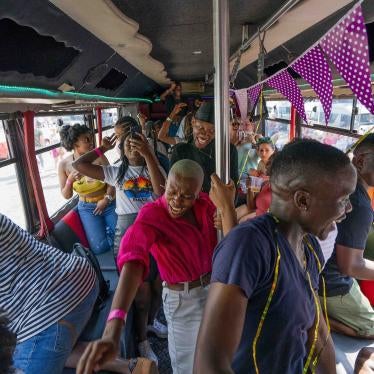(New York) - The United States government should use its upcoming human rights dialogue with the Chinese government to discuss serious abuses, and also to establish benchmarks for progress, Human Rights Watch said in a May 7, 2010 letter to Secretary of State Hillary Clinton.
The dialogue, the first of the Obama administration and the first such dialogue in two years, is scheduled to be held in Washington on May 13 and14.
"The deteriorating human rights environment in China should make for a crowded agenda," said Sophie Richardson, Asia advocacy director at Human Rights Watch. "But without clear benchmarks and achievable goals, this dialogue - like so many others - will make it all too easy for the Chinese government simply to check the ‘human rights' box with the United States."
In its letter, Human Rights Watch urged the administration to concentrate on three pressing issues:
- China's increasing restrictions on civil society groups, threatening to roll back hard-earned advances made by such organizations over the past decade. In the three days since Human Rights Watch sent its letter - which details the difficulties faced by nongovernmental organizations, human rights lawyers, and writers - a prominent Chinese activist who works on HIV/AIDS issues, Wan Yanhai, announced that he had temporarily sought refuge in the United States from increasing pressure by Chinese authorities, and two lawyers involved in human rights cases, Tang Jitian and Liu Wei, have been permanently disbarred.
- Arbitrary detention and enforced disappearances, ranging from petitioners who are held incommunicado in illegal detention facilities known as "black jails" to the dozens of Uighur men and boys forcibly disappeared following the Urumqi protests in July 2009.
- High-profile individual cases of imprisoned and persecuted dissidents, including Liu Xiaobo, nominated for this year's Nobel peace prize; Gao Zhisheng, a former human rights lawyer; and Hu Jia, an HIV/AIDS and human rights activist with a rapidly deteriorating medical condition. These cases, which were included on the list of individual cases provided to President Barack Obama ahead of his November 2009 trip to China, are a shameful reminder that China remains a one-party state that is intolerant of dissent.
Human Rights Watch said that the Obama administration's track record on engaging China on human rights issues had been mixed. It noted positive actions such as Obama's recent mention of abuses of journalists in China, but also lapses, such as a failure to address the de-registration on March 25 of the Women's Legal Research and Services Center at Beijing University, whose offices Clinton visited in February 2009. The Center's founder, Guo Jianmei, also received the Global Leadership award from Vital Voices, an international women's advocacy group that Clinton co-chairs.
In addition, Human Rights Watch urged the United States to raise these issues at the upcoming US-China Strategic and Economic Dialogue, as a means of integrating human rights issues into the core of US-China bilateral policy. That meeting is scheduled for May 23 in Beijing.
"This administration has offered up some potent rhetoric in support of human rights worldwide," Richardson said. "Now it's time to raise the issue - in a consistent and principled manner - with a powerful and intransigent government that is responsible for a host of gross human rights abuses."






